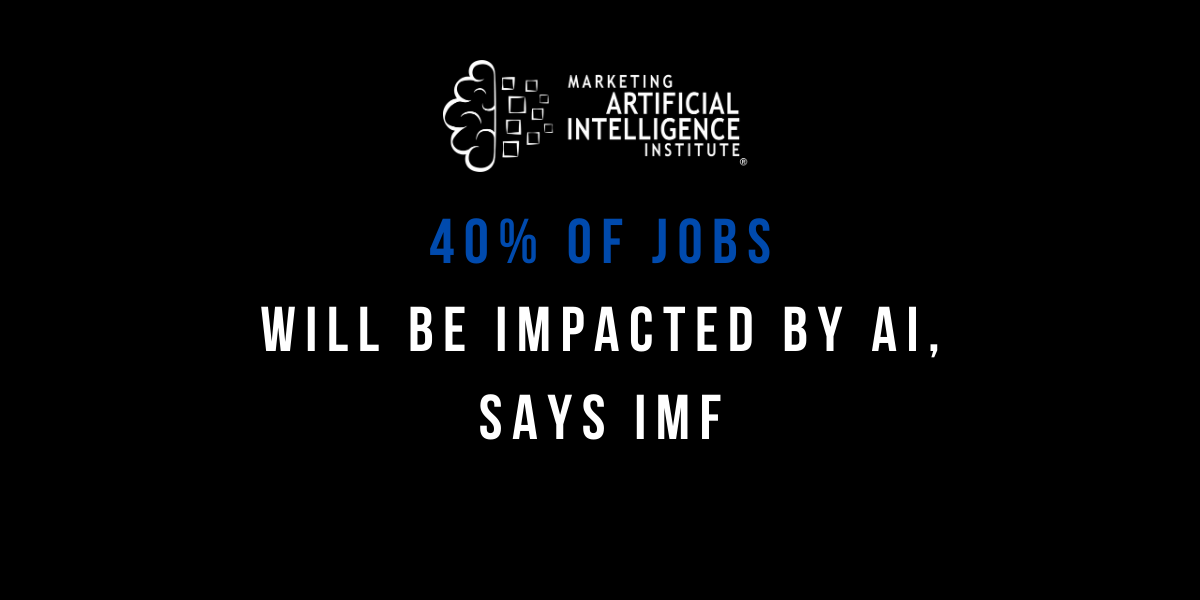40% of jobs across the globe could be affected by the rise of artificial intelligence, according to new research from the International Monetary Fund (IMF). A full 60% of them will be in “high-income” nations.
In the study, IMF researchers adapted a commonly used conceptual framework to measure the impact of AI on jobs. They found that advanced economies were most exposed to AI transformation since emerging markets and low-income countries lacked the infrastructure of skilled workers needed to harness the immediate benefits of AI.
The impact of AI on jobs could take both the form of job loss and job transformation. Some workers in high-income countries stand to benefit, increasing their labor productivity and earnings thanks to AI. But many will also see lower demand for their labor in the job market—and possible job displacement. And lower-income countries will generally lose out to higher-income countries that can leverage AI for macroeconomic benefits.
Overall, the research paints a picture of big winners and big losers—with little space in between.
Will AI take our jobs? How will it impact human labor? How will it affect demand for our skills in the labor market?
On Episode 80 of The Marketing AI Show, I got the answers from Marketing AI Institute founder/CEO Paul Roetzer.
AI Is Going to Impact Jobs Faster Than You Think
“Humanity has gone through disruptive general-purpose technology changes before, but we've never gone through changes that move so quickly,” says Roetzer.
“Usually, you have years or decades to adapt. This one probably isn't going to give us that much time.”
Workers may need to begin adapting to AI in the next 1-2 years.
But We Need to Think About AI’s Impact on Jobs Differently
But when we try to assess AI's impact on jobs, we often have flaws in our thinking, says Roetzer.
A lot of times, we think about it in a binary fashion. We either will or won't need a particular role, like lawyers or marketing consultants or customer service representatives.
In reality, AI isn't always going to replace a job wholesale and eliminate it by doing 100% of that job. It's far more likely it will lead to efficiency gains in that role, which will result in not needing as many people in the role.
Roetzer offers the example of accountants doing tax returns:
It's a very manual process. If AI gets really good at assisting CPAs with tax returns, to the point where they can do 5-10 times the number of returns they used to do in the same amount of time, the question becomes: Do you need as many accountants?
“The same logic can be applied to any form of knowledge work,” he says. If AI is able to do a percentage of what someone does for 100s of hours per month in their job, do we need as many people doing the work anymore?
“It's not that we think AI is going to come in and fully automate people out of jobs, but it seems very apparent it's going to drive massive efficiency gains in a lot of knowledge work roles.”
Nobody Has the Full Answer Here
“This is probably going to happen pretty quickly,” says Roetzer.
The question then becomes: Will companies have time to adapt to where they can find other responsibilities for people? Or are they just going to need fewer people to run companies at the level they're being run today?
“That's why studies like this are important because we don't have the answers." This type of research gives us one more piece of a puzzle that no one knows the full answer to—it's another data point to help us make sense of a picture that even top economists can't figure out on their own.
But Companies Need to Start Taking Action Now
“You need to start future-proofing your hires,” says Roetzer.
Companies need to be looking ahead at the job descriptions they're hiring for and begin assessing the possible impact AI will have on their needs. They should have someone internally who has a reasonable understanding of AI technology and where it's going in the next 12-18 months who can look at a job description and understand how AI might impact it. If the efficiency gains due to AI are significant, do you make the hire?
Another way to do this is by reviewing job descriptions, item by item, and identifying what can be intelligently automated by AI. You may find that you need to hire fewer people for different functions than you had normally planned, but also not need to reduce staff.
“Don't make new hires without assessing how AI is going to impact those roles,” says Roetzer.
But this isn't about looking for ways to cut headcount. It's about understanding the deeper impact AI is going to have on your needs so you can right-size your future hiring. And so you can start finding ways to reskill and upskill people who already work at your company with the AI skills they need to succeed.
Mike Kaput
As Chief Content Officer, Mike Kaput uses content marketing, marketing strategy, and marketing technology to grow and scale traffic, leads, and revenue for Marketing AI Institute. Mike is the co-author of Marketing Artificial Intelligence: AI, Marketing and the Future of Business (Matt Holt Books, 2022). See Mike's full bio.



